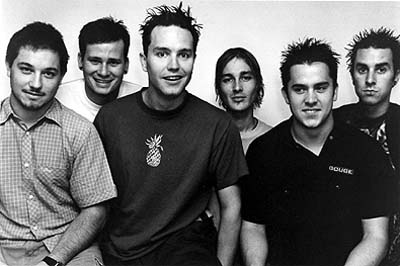
BIOGRAPHY
Blink-182
Genre - Punk, Rock
MCA
WHATEVER adjective you wish to apply to Blink-182 - crass, juvenile, obnoxious, scatological - no one can claim the band isn't market savvy. Slashing and burning through trails first laid out by So-Cal punk bands such as Green Day and Pennywise, the San Diego-based group has managed to forge a musical identity that's easily packaged and intellectually undemanding. Moreover, the group has elevated the notion of corporate sponsorship to a near art-form. Defying the long-held punk ethic that frowns on easy alliances between music and merchandise, Blink-182 (when they aren't naked) are often walking billboards for companies that furnish the band with sneakers, sunglasses, and other apparel.
Blink-182's beginnings can be traced to the fall of 1991, when the sister of Mark Hoppus (bass, vocals) introduced him to then-14-year-old Tom Delonge (guitar, vocals). The son of high-tech weapons engineer, Hoppus' early childhood was characterized by constant relocation and world travel necessitated by his father's occupation. By the late '80s, the family had settled in San Diego, where Hoppus - then in his mid teens - bought a bass guitar and began emulating songs by the Cure and the Descendants. At the time he met Delonge, he had just dropped out of college. Raised in an upper-middle class home just outside San Diego, Delonge
worked a job lifting and loading concrete bags at construction sites
prior to meeting Hoppus. With the addition of aspiring drummer Scott Raynor, the first incarnation of Blink-182 - then known as Blink - began playing clubs in and around San Diego. Presaging themes that would later surface in its songs, the group's early shows featured mildly risqué audience-participation routines such as wet T-shirt and wet pants contests. Meanwhile, Hoppus and Delonge befriended the Orange County punk rock group the Vandals, whose tiny label, Kung Fu, released Blink's cassette-only debut recording (titled Buddha) in 1994.
Less than a year later, Blink came to the attention of Cargo
Records, who signed the band to a one-album deal. The group's 1995 effort for the label, Cheshire Cat, was pedestrian at best, but there was no denying the band's growing popularity as a live act. Impressed by Blink's rabid following in Australia, MCA signed the group in 1996. After a slight modification to its band name (a nondescript Irish band already had dibs on "Blink," and it threatened to sue), the newly-christened Blink-182 released its
major label debut, Dude Ranch, the following year. The album quickly achieved platinum sales in Australia, while reaching gold status in Canada and the U.S. On the strength of heavy radio play and incessant touring, Blink-182
soon garnered a stateside following that was comparable to its popularity Down Under. During 1997, "Dammit (Growing Up)," the first single from Dude Ranch, became one of the five most-played songs at key radio stations KROQ (L.A.), KNDD (Seattle), WXRK (New York), KITS (San Francisco), and WBCN (Boston). Moreover, the band began assuming headline status on the annual Warped Tours, and undertook lengthy stints overseas with Fellow skate-punkers Unwritten Law and
Homegrown (on the "Poo-poo Pee-pee Tour") and with Less Than Jake (on a tour dubbed "Race Around Uranus").
In January of 1999, Blink-182 returned to San Diego and began work on the follow-up to Dude Ranch. By that time, Raynor had left the band (the departure was amicable, according to Hoppus), to be replaced by former Vandals drummer and Steely Dan acolyte Travis Barker. Released in July of 1999, Enema of the State solidified the group's status as punkers to be reckoned with. Evidencing its
predilection for silly puns and juvenile obsessions, the band centered the video for the first single from the album, "What's My Age Again?," on a naked romp through the streets of San Diego. Moreover, the group enlisted porn star "Janine" to grace the album cover in a nurse-bondage get-up. As the Enema of the State ascended the charts, a flurry of backlash began cropping up in press articles. In the wake of an assertion - by Howard Stern, no less - that executives at Playboy had asked Blink-182 to provide them with nude photos of fans (a claim Playboy vehemently denies, according to Spin magazine), punk-oriented
fanzines and publicists affiliated with punk groups tried to
dissociate themselves from Blink-182's lyrical motifs and its stage antics, which generally include requests for female fans to bare their breasts. Thus far, the band appears to be enjoying the attendant publicity while defending itself against accusations of misogyny.
Meanwhile, upcoming activities for Blink-182 include a fall and winter tour with silverchair. The group was also recently chosen to record a version of the Jan and Dean classic, "Dead Man's Curve," for the TV miniseries, The History of Rock 'n' Roll. The band had one of its songs - "Dammit (Growing Up)" - featured in the teen flick, Can't Hardly Wait, and the trio also made a cameo appearance
in the movie, American Pie, in which the members essentially
portrayed themselves. So it would seem that future film and TV work is almost a certainty ... consider yourselves warned.
|

